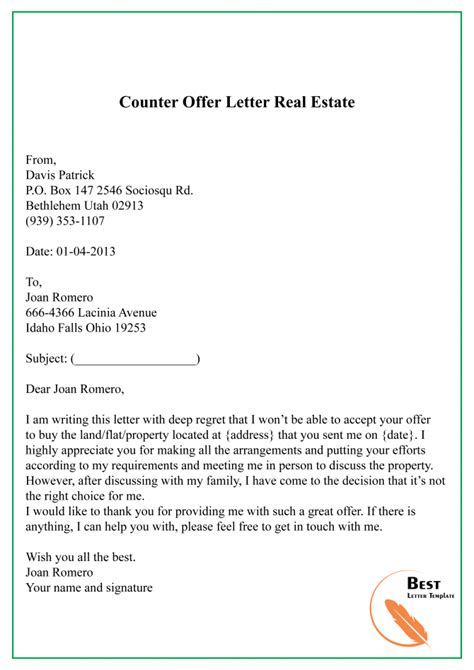Crafting A Counteroffer Letter: Templates And Tips

When negotiating a job offer, it’s not uncommon to receive a salary or benefits package that doesn’t quite meet your expectations. In such cases, crafting a counteroffer letter can be an effective way to communicate your needs and negotiate better terms. Here are some templates and tips to help you draft a winning counteroffer letter.
1. Understand Your Worth
Before you begin drafting your counteroffer letter, it’s essential to understand your worth in the job market. Research similar job positions and their salary ranges in your industry and location. You can use online tools such as Glassdoor, Payscale, or Salary.com to get an idea of what your skills and experience are worth.
2. Review the Offer Carefully
Review the job offer carefully and take note of the salary, benefits, and other terms that the employer has offered. Identify the areas where you feel the offer falls short of your expectations or needs. This will help you craft a counteroffer that addresses these issues.
3. Express Gratitude
Begin your counteroffer letter by expressing gratitude for the job offer. Thank the employer for considering you for the position and express your enthusiasm for the opportunity to work with them.
4. State Your Concerns
State your concerns and the reasons for your counteroffer. Be specific and provide data to support your request. For example, if you’re requesting a higher salary, explain how your skills and experience justify the increase.
5. Offer a Compromise
Offer a compromise that benefits both parties. For instance, you could suggest a salary increase in exchange for a longer workweek or additional responsibilities. Be open to negotiation and willing to find common ground.
6. Use a Professional Tone
Use a professional tone throughout your counteroffer letter. Avoid being confrontational or aggressive, as this can harm your chances of reaching a compromise. Instead, be respectful, polite, and assertive in your communication.
7. Proofread and Edit
Proofread and edit your counteroffer letter carefully. Check for grammatical errors, typos, or other mistakes that could undermine your credibility. Make sure your letter is well-organized, easy to read, and professional in appearance.
8. Follow Up
Follow up with the employer after sending your counteroffer letter. Be patient and give them time to review and respond to your proposal. If you don’t hear back after a reasonable amount of time, you can send a polite email or make a phone call to inquire about the status of your request.
9. Use a Counteroffer Letter Template
If you’re not sure how to format your counteroffer letter or what information to include, you can use a counteroffer letter template. There are many templates available online that you can customize to fit your needs.
10. Seek Legal Advice
If you’re unsure about the legal implications of your counteroffer letter, seek legal advice from an attorney who specializes in employment law. They can help you understand your rights, assess the risks, and negotiate a fair deal.
Conclusion
Crafting a counteroffer letter can be an effective way to negotiate better terms for a job offer. By following these templates and tips, you can communicate your needs and reach a compromise that benefits both parties.
FAQs
What should I include in my counteroffer letter?
Your counteroffer letter should include an expression of gratitude, a statement of your concerns, a proposed compromise, and a professional tone. You can also use a counteroffer letter template to guide your writing.
How do I negotiate a job offer?
You can negotiate a job offer by researching your worth, reviewing the offer carefully, and crafting a counteroffer letter that addresses your concerns. Be open to compromise and willing to find common ground with the employer.
What if the employer rejects my counteroffer?
If the employer rejects your counteroffer, you can decide whether to accept the original offer or decline the job. It’s important to weigh the pros and cons and consider your priorities and long-term career goals.
Should I seek legal advice before sending my counteroffer letter?
If you’re unsure about the legal implications of your counteroffer letter, seek legal advice from an attorney who specializes in employment law. They can help you understand your rights, assess the risks, and negotiate a fair deal.
